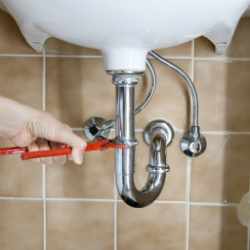
For the first 10 months of our marriage, my wife and I rented an apartment. Then we bought a condo where we lived for five years. And then we bought a house. We didn’t purposefully set out to follow that pattern; it’s just how our living arrangements unfolded. However, it turned out to be a great way to ease into home ownership that I now recommend to other young couples.
When something goes wrong with your apartment, you just call your landlord. As long as you weren’t at fault, the apartment owner will cover the cost of the repair. It removes a potentially big source of stress, and the possibility of big, unpleasant expenses, from the early days of your marriage.
When some things go wrong with a condo, you can call the condo association. At our condo, we had numerous problems—from a leaky pipe inside the wall of an upstairs neighbor to water in our basement after a bad storm. Each time, the condo association paid for the repair. Condos are like homes with training wheels. You have to take responsibility for some repairs, like a broken dishwasher. However, the association will probably cover many of the bigger items, such as a roof repair or malfunctioning air conditioner.
But once you buy a home, whenever anything goes wrong, it’s all on you. Need a new roof? That might cost you $10,000. A new air conditioner and furnace? Maybe $5,000. I don’t say all that to scare you out of buying a home. I just say it to encourage you to be prepared.
One of the biggest mistakes I see new homeowners make is not planning for the cost of maintenance, repairs, and the replacement of costly items. It’s far better to spend the time and a little bit of money filling in cracks in your driveway than to have to replace part of your driveway. By the same token, it’ll be less expensive to have your air conditioner and furnace cleaned and checked before each season than to have to replace the units prematurely.
So, allocate some money in your monthly budget for home maintenance and repair—$200 per month is about right. Some months you won’t spend nearly that much, other months you’ll spend much more.
Even for those who do a good job of keeping up with home maintenance and repairs, no one escapes home ownership without incurring some big expenses eventually. Think about some of your home’s most expensive items. How old is its roof? What about your air conditioner and furnace? Your refrigerator? Realistically, how much longer do you think each one will last? Are you saving for their replacement?
I recommend maintaining three separate savings accounts: One for emergencies (three to six months’ worth of living expenses), one for periodic bills and expenses (each month, put one-twelfth of the annual cost of all such items, including annual insurance premiums, vacations, and Christmas gifts, into this account), and one for the replacement of big-ticket items.
If that sounds overwhelming, start small. Even little bits saved over a long period of time will add up to a lot. When you get a tax refund or bonus, put a portion into savings. If you get a raise, dedicate part of it to savings.
The most important key to being able to afford the ongoing maintenance and repairs of a home, and to save for the replacement of big-ticket items, is not buying too much house in the first place. Keeping the combination of your mortgage, property taxes, and homeowner’s insurance to no more than 25% of monthly gross income—preferably on one income if you are a two-income household—will go a long way toward giving you the wherewithal to give generously and save adequately.
Owning a home brings many benefits, but it’ll be much more enjoyable if you’ve planned ahead for all of its ongoing costs.
If you’re a homeowner, how much do you allocate for monthly maintenance and repairs, and how do you save for the replacement of big-ticket items?
Matt Bell is the author of Trusted: Preparing Your Kids for a Lifetime of God-Honoring Money Management. He speaks at churches and conferences throughout the country and writes the MattAboutMoney blog.
This article should not be considered legal, tax, or financial advice. You may wish to consult a tax or financial advisor about your individual financial situation.



